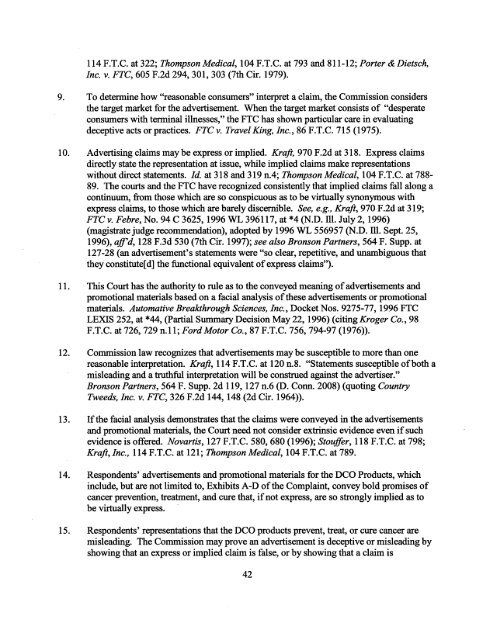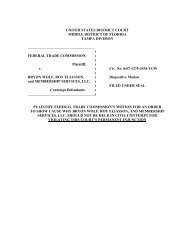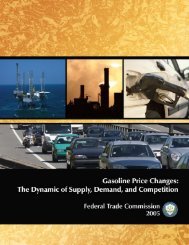Complaint Counsel's Post Trial Brief - Federal Trade Commission
Complaint Counsel's Post Trial Brief - Federal Trade Commission
Complaint Counsel's Post Trial Brief - Federal Trade Commission
Create successful ePaper yourself
Turn your PDF publications into a flip-book with our unique Google optimized e-Paper software.
114 F.T.C. at 322; Thompson Medical, 104 F.T.C. at 793 and 811-12; Porter & Dietsch,<br />
Inc. v. FTC, 605 F.2d 294,301,303 (7th Cir. 1979).<br />
9. To deterine how "reasonable consumers" interpret a claim, the <strong>Commission</strong> considers<br />
the target market for the advertsement. When the target market consists of "desperate<br />
consumers with terinal ilnesses," the FTC has shown parcular care in evaluating<br />
deceptive acts or practices. FTC v. Travel King, Inc., 86 F.T.C. 715 (1975).<br />
10. Adverising claims may be express or implied. Kraft, 970 F .2d at 318. Express claims<br />
directly state the representation at issue, while implied claims make representations<br />
without direct statements. Id. at 318 and 319 n.4; Thompson Medical, 104 F.T.C. at 788<br />
89. The cours and the FTC have recognzed consistently that implied claims fall along a<br />
continuum, from those which are so conspicuous as to be virally synonymous with<br />
express claims, to those which are barely discerble. See, e.g., Kraft, 970 F .2d at 319;<br />
FTC v. Febre, No. 94 C 3625, 1996 WL 396117, at *4 (N.D. ilL. July 2, 1996)<br />
(magistrate judge recommendation), adopted by 1996 WL 556957 (N.D. ilL. Sept. 25,<br />
1996), ajfd, 128 F.3d 530 (7th Cir. 1997); see also Bronson Partners, 564 F. Supp. at<br />
127-28 (an adversement's statements were "so clear, repetitive, and unambiguous that<br />
they constitute( d) the fuctional equivalent of express clais").<br />
11. Ths Cour has the authority to rule as to the conveyed meang of adversements and<br />
promotional materals based on a facial analysis of these adversements or promotional<br />
materals. Automative Breakthrough Sciences, Inc., Docket Nos. 9275-77, 1996 FTC<br />
LEXIS 252, at *44, (Parial Sumar Decision May 22, 1996) (citing Kroger Co., 98<br />
F.T.C. at 726, 729 n.ll; Ford Motor Co., 87 F.T.C. 756, 794-97 (1976)).<br />
12. Commssion law recognzes that adverisements may be susceptible to more than one<br />
reasonable interretation. Kraft, 114 F.T.C. at 120 n.8. "Statements susceptible of both a<br />
misleading and a trthful interretation wil be constred against the adveriser."<br />
Bronson Partners, 564 F. Supp. 2d 119, 127 n.6 (D. Conn. 2008) (quotig Country<br />
Tweeds, Inc. v. FTC, 326 F.2d 144, 148 (2d Cir. 1964)).<br />
13. If the facial analysis demonstrates that the clais were conveyed in the adverisements<br />
and promotional materals, the Cour need not consider extrsic evidence even if such<br />
evidence is offered. Novartis, 127 F.T.C. 580,680 (1996); Stouffer, 118 F.T.C. at 798;<br />
Kraf, Inc., 114 F.T.C. at 121; Thompson Medical, 104 F.T.C. at 789.<br />
14. Respondents' adverisements and promotional materals for the DCO Products, which<br />
include, but are not limted to, Exhbits A - D of the <strong>Complaint</strong>, convey bold promises of<br />
cancer prevention, treatment, and cure that, if not express, are so strongly implied as to<br />
be virally express.<br />
15. Respondents' representations that the DCO products prevent, treat, or cure cancer are<br />
misleading. The <strong>Commission</strong> may prove an adverisement is deceptive or misleading by<br />
showing that an express or implied claim is false, or by showing that a claim is<br />
42

















